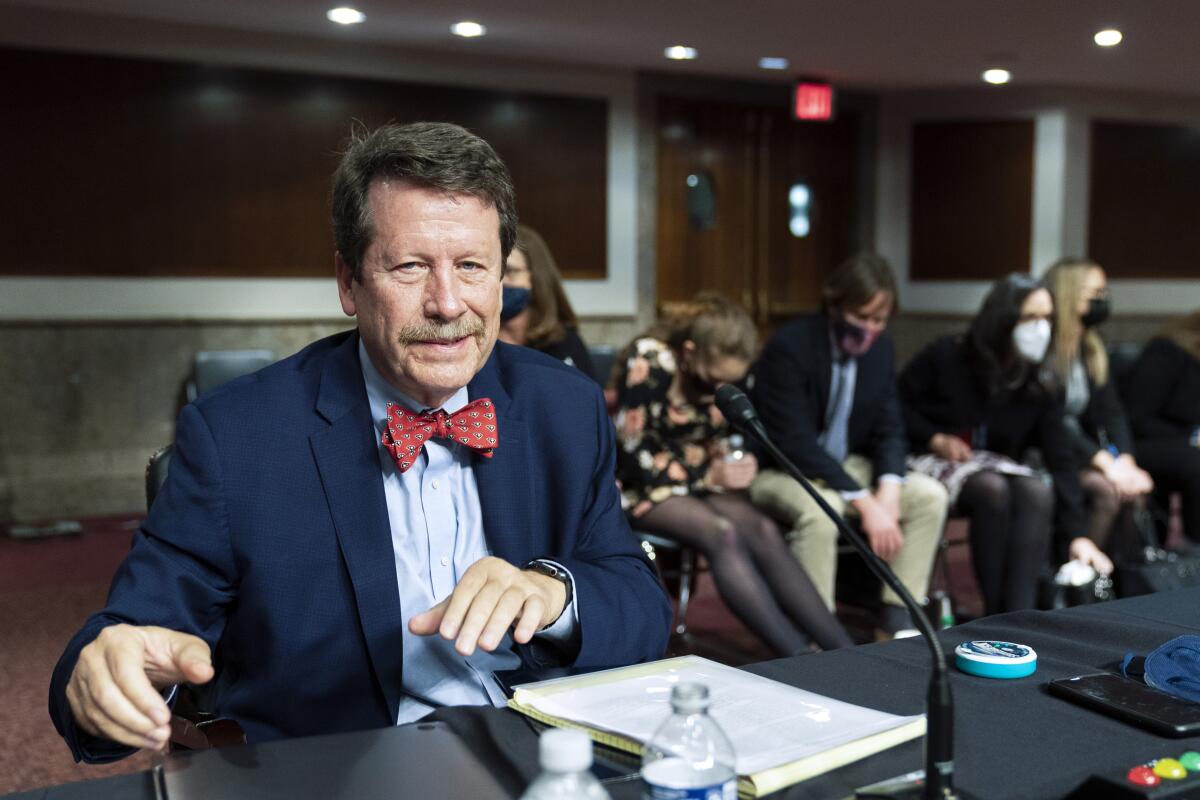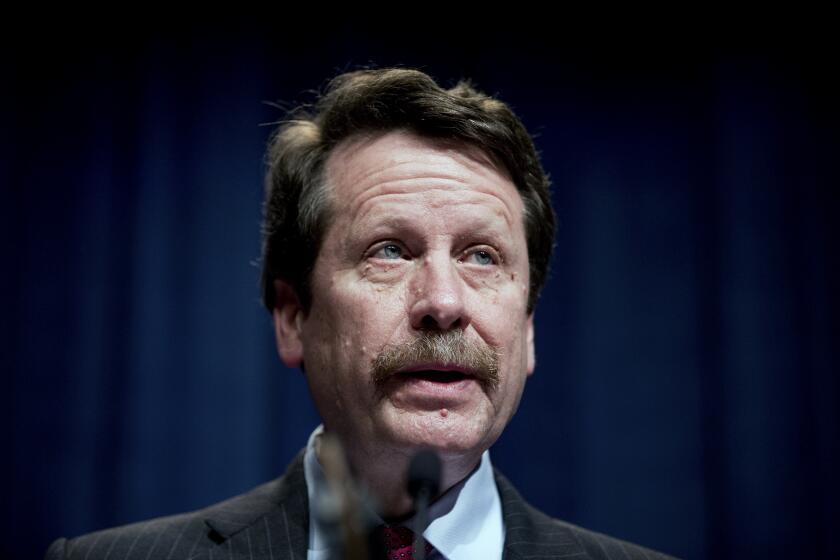Senate confirms Biden’s FDA pick despite political divisions

- Share via
WASHINGTON — The Senate narrowly confirmed President Biden’s pick to lead the Food and Drug Administration on Tuesday, pushing past a thicket of political controversies that threatened to derail what was initially expected to be an easy confirmation.
The 50-46 vote means Dr. Robert Califf, a cardiologist and prominent medical researcher, will again lead the powerful regulatory agency, which he briefly headed during the end of President Obama’s administration.
The FDA hasn’t had a permanent leader in more than a year despite playing a central role in the COVID-19 response effort, reviewing the vaccines, drugs and tests used to fight the pandemic.
The razor-thin vote underscores the increasing political polarization around the healthcare issues FDA oversees and contrasts with Califf’s overwhelming support just six years ago. The Senate previously confirmed him to the job by a vote of 89-4.
Califf now inherits a raft of reviews and decisions pending at the agency, which regulates several multibillion-dollar industries, including prescription and over-the-counter drugs, medical devices, tobacco products and most foods.
Califf’s to-do list also includes specific commitments he’s made to Senate lawmakers to clinch the job. In particular, he has vowed to quickly launch a comprehensive review of opioid painkillers like OxyContin, which helped trigger the worst drug epidemic in U.S. history after their FDA approval in the 1990s.
An FDA panel postpones a meeting on Pfizer’s COVID-19 vaccine for children under 5 after the drugmaker said it has new data to add to its application.
Sen. Joe Manchin (D-W.V.) urged senators to oppose Califf on Monday, saying he bears “a great deal of responsibility” for many of the drug overdose deaths that have occurred in the years since his first stint as FDA commissioner. During his 11-month tenure, Califf added new warning labels to opioids and commissioned outside recommendations on how to tighten regulation of the drugs. But he was replaced by then-President Trump before implementing any major changes.
“Nothing that Dr. Califf has said or done has led me to believe he will operate the FDA any differently than he did during his previous tenure,” said Manchin, whose home state has been ravaged for decades by opioid addiction and overdoses.
The White House long assumed enough Republicans would support Califf to easily overcome any Democratic defections, given his strong support from pharmaceutical companies and patient groups.
But anti-abortion advocates recently launched a campaign to sink his Senate vote, outraged by a recent FDA decision that eased access to abortion pills. Groups including the Susan B. Anthony List threatened to pull support from any Republican senators supporting Califf.
More than a year after authorizing the first COVID-19 vaccines, the FDA still faces a string of key decisions, including whether to expand their use to children younger than 5. Last week the FDA unexpectedly delayed its timeline for reviewing Pfizer’s vaccine for that age group.
President Biden is nominating former Food and Drug Administration chief Dr. Robert Califf to lead the agency again.
FDA commissioners aren’t typically involved in day-to-day scientific reviews, but they serve as the go-between for the agency’s scientists and the White House. That relationship has strained over the past year as Biden’s coronavirus COVID-19 task force has repeatedly gotten out ahead of the FDA’s methodical, scientific reviews.
Califf will also need to replace the head of the FDA’s tobacco center, which is weighing whether to ban e-cigarettes from Juul, Reynolds American and other vaping companies due to their use by teens. FDA tobacco’s longtime director, Mitch Zeller, is set to retire this spring.
The FDA is also crafting new regulations to ban menthol cigarettes, a long-sought goal for many Democratic lawmakers and public health advocates.
Califf has publicly championed the potential to save hundreds of thousands of lives by embracing FDA’s authority to ban certain tobacco products and ingredients. Though the FDA has had those powers for more than a decade, its efforts to regulate both traditional cigarettes and e-cigarettes have been stymied by industry lawsuits.
Califf first came to the FDA after more than 35 years at Duke University, where he founded a contract research organization that conducts studies for many of the world’s largest drugmakers.
Since leaving government he has worked as a health policy advisor for Google and served as a board director or advisor to more than a half-dozen drug and biotech companies. In keeping with federal procedure, Califf agreed to resign from all of those positions and sell off several million dollars in investments in FDA-regulated companies, according to his ethics disclosures form.
More to Read
Sign up for Essential California
The most important California stories and recommendations in your inbox every morning.
You may occasionally receive promotional content from the Los Angeles Times.












